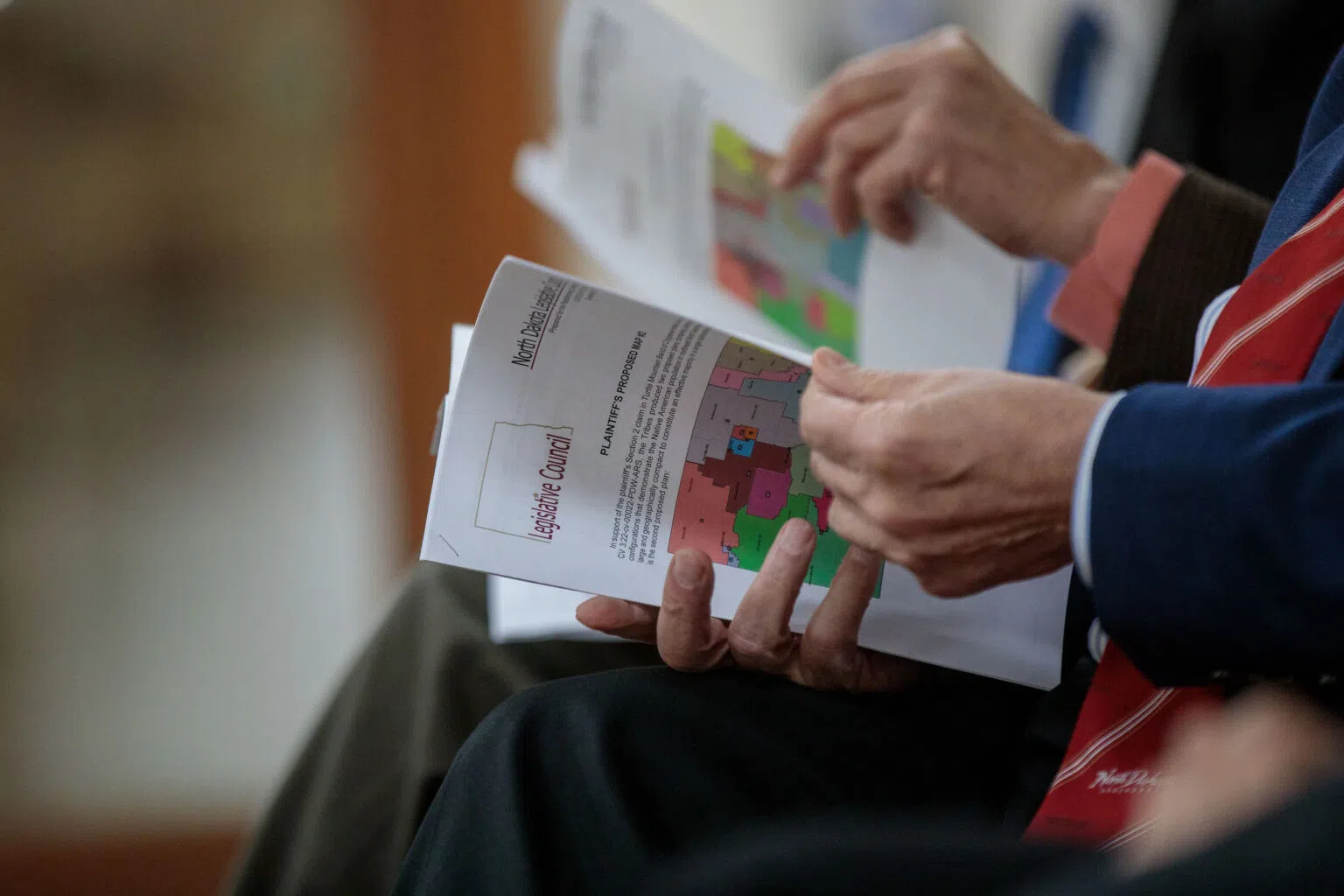
Legislators attending a Redistricting Committee meeting Dec. 13, 2023, look at maps of different proposals. (Kyle Martin/For the North Dakota Monitor)
By: Mary Steurer
WASHINGTON (North Dakota Monitor) – Two North Dakota tribes and a group of tribal citizens have asked the U.S. Supreme Court to keep North Dakota’s district map in place while it considers whether to review a voting discrimination lawsuit against the state.
The Turtle Mountain Band of Chippewa, Spirit Lake Nation and three tribal members filed suit against North Dakota over a 2021 redistricting map they say diluted the power of Indigenous voters in violation of the federal Voting Rights Act.
North Dakota U.S. District Court Judge Peter Welte in 2023 concluded the map is discriminatory and ordered the state to adopt different district lines, but the 8th Circuit reversed his decision in May. The appellate court’s ruling found that private citizens have no means of filing lawsuits under the Voting Rights Act to challenge racially discriminatory voting practices. The 8th Circuit indicated it would send the case back to Welte and direct him to dismiss the lawsuit.
The plaintiffs are getting ready to ask the Supreme Court to review the lawsuit. On Tuesday, they requested that the court allow Welte’s map to stay in place until a final decision in the case is reached.
The plaintiffs said in court filings they could suffer lasting harm if the 2021 map is allowed to go back into effect.
The May decision, in tandem with other recent rulings by the court, has made the 8th Circuit the only circuit in the country where private citizens and organizations cannot bring lawsuits under Section 2 of the Voting Rights Act, which outlaws voting practices that discriminate based on race. The 8th Circuit has determined that it’s the role of the U.S. attorney general to enforce Section 2.
The plaintiffs dispute the 8th Circuit’s findings and say that Congress always intended for private citizens to be able to bring legal challenges under the provision. The appellate court has removed an important tool Native Americans use to protect their voting rights, the plaintiffs wrote in a Tuesday filing with the U.S. Supreme Court.
“North Dakota — like many states — has a long and sad history of official discrimination against Native Americans that persists to this day,” the plaintiffs stated. “Tribal Nations and individual Native American voters have successfully fought for decades to vindicate their voting rights under Section 2.”
Over the past several decades, most lawsuits filed under Section 2 of the Voting Rights Act have been brought by private groups and not the U.S. Department of Justice, they noted.
The results of the 2024 election also indicate that Welte’s map made an important difference to Indigenous voters in District 9, they added.
In 2024, after Welte’s ruling, three Native American lawmakers were elected to the state Legislature from District 9, drawn to include two reservations: Sen. Richard Marcellais and Rep. Jayme Davis — both citizens of the Turtle Mountain Band of Chippewa — and Rep. Collette Brown, a citizen of the Spirit Lake Nation and plaintiff in the lawsuit. All three are Democrats.
“The fair map we secured led to a historic first — a Spirit Lake Nation member elected to the North Dakota legislature,” Spirit Lake Nation Chairperson Lonna Jackson-Street previously said in a statement about the 8th Circuit’s ruling.
Three North Dakota lawmakers would no longer live in the districts they represent if the 2021 map goes back into place, including Brown.
Attorneys for the North Dakota Legislature have said it’s not clear whether those lawmakers would be able to serve out the remainder of their terms or if they would be subject to removal from office. That means Brown could lose her seat if the 8th Circuit’s judgment goes into effect, the plaintiffs wrote in their filing with the U.S. Supreme Court.
The map imposed by Welte remains in effect for now, though the 8th Circuit is expected to issue its mandate lifting a hold on the 2021 map this week, notwithstanding any intervention by the U.S. Supreme Court, said Mark Gaber, a Campaign Legal Center attorney representing the plaintiffs.
The Supreme Court on Tuesday asked the state to file its response to the plaintiffs’ motion by July 22. North Dakota has maintained that the 2021 map is not discriminatory and that it agrees with the 8th Circuit’s finding that the tribes lack standing to sue.
Last week, the plaintiffs asked for a similar stay from the 8th Circuit, though the court declined.
It’s very rare for the U.S. Supreme Court to agree to take a case, though the plaintiffs are hopeful the justices will hear the lawsuit to resolve the split between the circuits.
“This is the country’s most important civil rights statute, so I think the odds are high that they’ll take it,” Gaber said Tuesday. The plaintiffs’ deadline to officially petition the high court to review the lawsuit is in October, he added.
The 8th Circuit includes North Dakota, South Dakota, Minnesota, Iowa, Missouri, Nebraska and Arkansas.




Comments